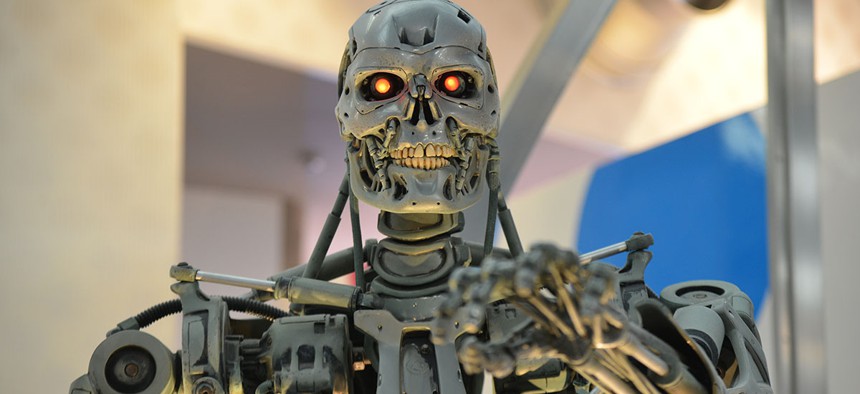Congressional AI Caucus Wants to Separate Fact From Fiction

Sarunyu L/Shutterstock.com
Rep. John Delaney, D-Md., wants to educate Congress about artificial intelligence.
It’s rare for a congressional caucus to have no clear legislative agenda.
But for one bipartisan group dedicated to artificial intelligence, the mission is primarily to show lawmakers the technology isn't evil and could help both the public and private sectors do their jobs better.
Reps. John Delaney, D-Md., and Pete Olson, R-Texas, founded the AI Caucus in May. The inaugural briefing, attended by the senior vice president of IBM's Watson division, happened Wednesday.
» Get the best federal technology news and ideas delivered right to your inbox. Sign up here.
Delaney told reporters he hopes the briefings and discussions will give lawmakers a “balanced perspective” of artificial intelligence, so the subsequent policy conversations are rooted in fact instead of fears about widespread unemployment as human jobs are automated.
“When they hear about it, they think of the 'Terminator' movie and this notion of the singularity," he said. "In reality, there's going to be millions of steps along the the way," requiring both industry and the public sector to talk about issues including unemployment and the ethics surrounding decisions made by algorithms.
He compared lawmakers and citizens' fears of automation and artificial intelligence to the uproar about globalization and its impact on domestic industries. Globalization "has been net positive, but it hasn't been positive for everyone," Delaney said, adding the government "could have done more to support the people, who we should have known would be negatively affected by globalization."
That has been a "failure of public policy," which he hopes won't be replicated as artificial intelligence develops and begins to replace some jobs, he explained. "If we don’t do some things it will be negative for a bunch of people," Delaney said.
But in the caucus' early stages, it's premature to discuss specific solutions to the automation problem, Delaney said.
Technologists and researchers have proposed a "universal basic income," in which every citizen is guaranteed a wage, or taxes on automation to discourage companies from replacing human jobs.
“If you have a view that there will be a lot of disruption and that there needs to be a role for government in managing that, you are going to need to find some revenues to pay for that," he said, referring to the so-called robot tax. But potentially more realistic in the short-term, he said, is "wage support for certain jobs that really need to be done in society, but there's not a great economic model for them."
Artificial intelligence could also help the federal government modernize, but it also requires agencies to shore up the procurement process so they can take advantage of cutting-edge technology, Delaney said.
David Kenny, IBM's senior vice president for Watson and Cloud, recently wrote an open letter to Congress asking it to talk more about artificial intelligence and its potential impact on society. He suggested neither the robot tax nor universal basic income are viable solutions to the automation problem.
“Such prescriptions are short term cop-outs that ignore the problem: that the US has a shortage of workers with the skills needed to work in partnership with AI systems," he wrote. "What we should focus on is realigning America’s education system to emphasize skills rather than degrees. Many of the jobs available today in fields where AI is being applied require specific technical skills, but not always a bachelor’s degree."
NEXT STORY: Nextgov Event: Tech Refresh Thursday





